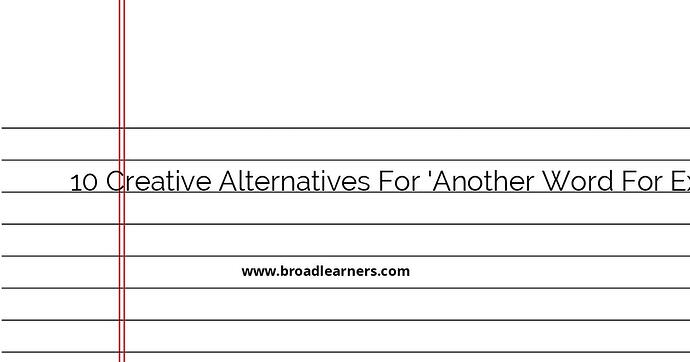Looking for creative alternatives to the phrase 'another word for experiences'? You've come to the right place. Here are 10 different ways you can express the concept of experiences:
- Journeys
- Adventures
- Encounters
- Episodes
- Occurrences
- Events
- Happenings
- Incidents
- Scenarios
- Situations
Each of these alternatives brings a unique flavor to your writing or speech. Let's explore each one with examples:
1. Journeys
Instead of using 'experiences,' you can opt for 'journeys' to signify the various encounters and events you've been through. It adds a sense of progression and exploration to your narrative.
Example:
Her journeys around the world broadened her perspective and enriched her life.
2. Adventures
'Adventures' conveys a sense of excitement and unpredictability associated with experiences. It suggests a thrilling and daring element within the context of your encounters.
Example:
The adventures she embarked on taught her valuable lessons about courage and resilience.
3. Encounters
Using 'encounters' highlights the interactions and meetings you've had throughout your experiences. It emphasizes the connections made and lessons learned from these encounters.
Example:
His encounters with different cultures broadened his understanding of diversity and inclusion.
4. Episodes
'Episodes' suggests distinct and meaningful segments within your experiences. It implies a series of events or moments that contribute to your overall journey.
Example:
Each episode of his life added a new dimension to his personal growth and development.
5. Occurrences
'Occurrences' refers to specific incidents or happenings that shape your experiences. It highlights the noteworthy events that have impacted you.
Example:
The occurrences during her travels served as inspiration for her creative work.
6. Events
'Events' encompass a wide range of happenings and occasions that contribute to your experiences. It signifies the significant milestones and moments in your life.
Example:
Attending the events allowed her to network and connect with like-minded individuals.
7. Happenings
'Happenings' captures the spontaneous and unfolding nature of experiences. It conveys a sense of immediacy and liveliness within your narrative.
Example:
The happenings of that day left a lasting impact on her outlook towards life.
8. Incidents
'Incidents' refers to specific events or occurrences that have significance in your experiences. It emphasizes the critical moments that shape your story.
Example:
The incidents she encountered during her career path influenced her decision to pursue a new direction.
9. Scenarios
'Scenarios' points to potential situations or sequences of events within your experiences. It suggests different possibilities and outcomes based on varying circumstances.
Example:
Exploring different scenarios helped him prepare for the challenges ahead in his project.
10. Situations
Using 'situations' emphasizes the context and conditions in which your experiences unfold. It underscores the scenarios and environments that impact your journey.
Example:
Dealing with challenging situations at work taught her valuable problem-solving skills and resilience.
Did I miss anything? Respond below
